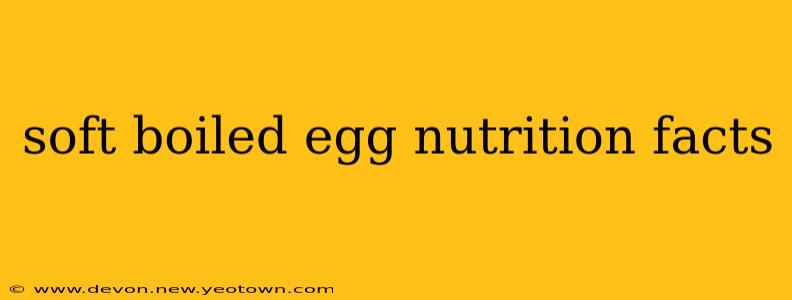The soft-boiled egg. A culinary classic, a breakfast staple, and a surprisingly nutritional powerhouse. But beyond its creamy yolk and perfectly set white, what exactly are the nutrition facts behind this humble egg? Let's dive into the details, exploring everything from its protein content to its vitamin profile, and answering some frequently asked questions along the way.
Imagine this: the gentle tap of a spoon against the shell, the satisfying crack, and the velvety smooth yolk oozing onto your toast. That's the magic of a soft-boiled egg. But beyond its simple pleasure, it’s a nutritional champion, packed with essential vitamins and minerals crucial for a healthy body and mind.
What are the nutritional benefits of a soft-boiled egg?
A single large soft-boiled egg (approximately 50 grams) is a nutritional goldmine. It's a fantastic source of high-quality protein, essential for building and repairing tissues, maintaining muscle mass, and supporting a healthy immune system. But the benefits extend far beyond protein. Let's unpack some key nutrients:
- Protein: Around 6 grams of protein per egg – vital for satiety and maintaining a healthy weight.
- Choline: A nutrient often overlooked, choline plays a crucial role in brain health, liver function, and cell membrane structure. Soft-boiled eggs are an excellent source.
- Vitamins: Soft-boiled eggs are rich in vitamins like vitamin D (essential for bone health and immune function), vitamin B12 (crucial for nerve function and red blood cell formation), and riboflavin (important for energy metabolism).
- Minerals: They also provide a good dose of selenium (an antioxidant that protects cells from damage), and phosphorus (key for bone and teeth health).
How many calories are in a soft-boiled egg?
A single large soft-boiled egg contains approximately 78 calories. This makes it a relatively low-calorie, high-protein food, ideal for those watching their weight. The calorie count can slightly vary depending on the size of the egg.
Is it better to eat a soft-boiled egg or a hard-boiled egg?
Both soft-boiled and hard-boiled eggs offer similar nutritional benefits. The primary difference lies in texture and cooking time. The nutritional content remains largely unchanged during the boiling process. The choice between the two often comes down to personal preference. Some people appreciate the runny yolk of a soft-boiled egg, while others prefer the firm texture of a hard-boiled egg.
Are soft-boiled eggs good for weight loss?
Yes, soft-boiled eggs can be a valuable asset in a weight-loss diet. Their high protein content promotes satiety, helping you feel full for longer and reducing overall calorie intake. This can significantly contribute to weight management efforts.
What are the potential downsides of eating soft-boiled eggs?
While generally safe and healthy, there are a few potential downsides to consider:
- Cholesterol: Eggs contain cholesterol, but research has shown that dietary cholesterol has less of an impact on blood cholesterol levels than previously believed. However, individuals with high cholesterol should still monitor their intake.
- Salmonella: Always use fresh, high-quality eggs and ensure they are cooked thoroughly to reduce the risk of salmonella contamination.
How many soft-boiled eggs should I eat per day?
There's no single magic number. Most health organizations recommend consuming up to one egg per day as part of a balanced diet. However, individual needs may vary, and consulting a doctor or registered dietitian is always a good idea, especially if you have any underlying health conditions.
In conclusion, the humble soft-boiled egg is far more than just a breakfast treat. It’s a convenient, delicious, and nutritious food packed with essential vitamins and minerals. So next time you’re looking for a quick, healthy, and protein-rich meal, consider the simple pleasure and substantial nutritional benefits of a perfectly soft-boiled egg.

